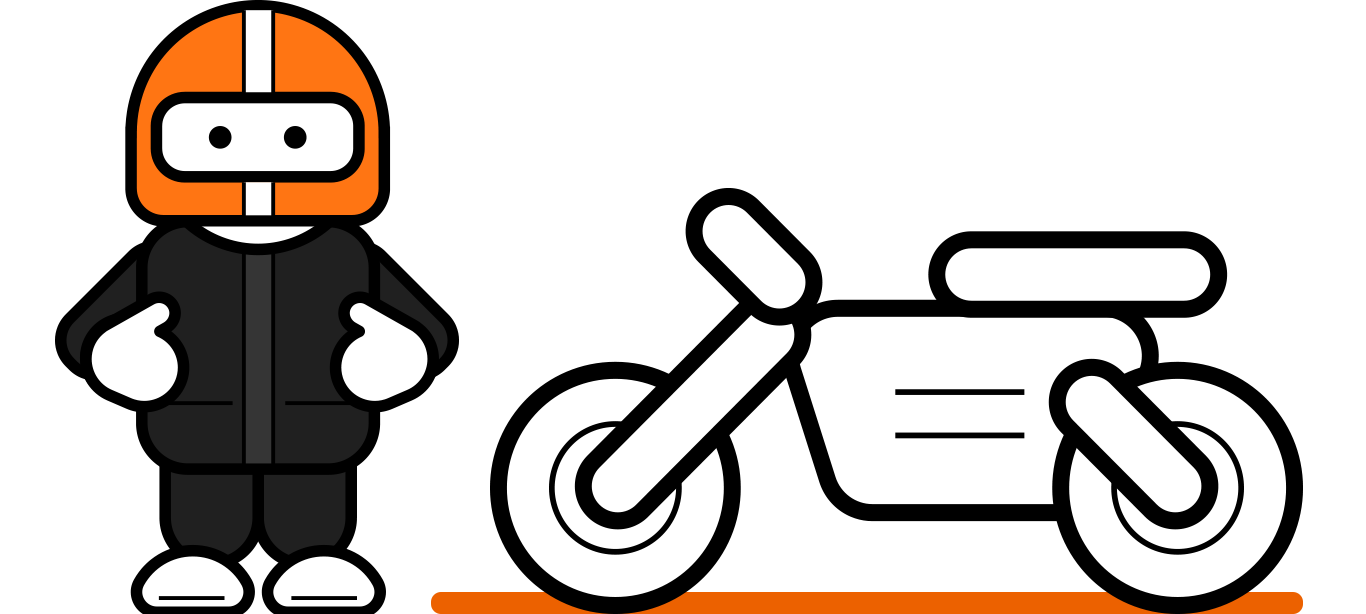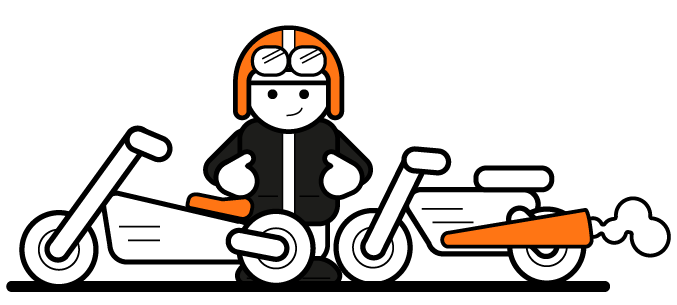- Car
- Car Insurance
- Imported Car Insurance
- Non-UK License Holder Insurance
- Previously Cancelled Insurance
- Temporary Car Insurance
- Van
- Van
- Fleet Insurance
- Home & Property
- Home Insurance
- Holiday Home Insurance
- Landlord Insurance
- Park Home Insurance

Whether you’ve recently purchased your first motorbike or are an experienced rider, motorbike insurance should be near the top of your priorities. Even if you only ride during certain seasons, it’s illegal to not have year-round insurance unless you have a Statutory Off Road Notification (SORN).
To help you find the best motorcycle insurance to suit your needs, read our beginners guide. Find out more about what the insurance is, the different types of motorcycle insurance and ways you can reduce the cost.
[definition snippet] Motorbike insurance provides financial protection if you are involved in a motoring incident. It protects you against physical damage, theft and bodily injury as well as cover if you are liable for any damage on another vehicle or person. [definition snippet] (please see an example of a definition snippet from a competitor’s site here: https://www.money.co.uk/motorbike-insurance/what-is-motorbike-insurance.htm)
If you don’t have motorcycle insurance and yet are continuing to ride a motorbike, then you are acting illegally. If you are caught riding without insurance, then you may be heavily fined or even banned from driving.

There are three levels of cover available – third-party, third-party with theft and fire and comprehensive.
1. Third-party: This is the minimum insurance required by law. It covers injury or damage to other people, but not yourself.
2. Third-party, fire and theft: The same as third party but also covers any costs that may occur if your bike is stolen or damaged by fire.
3. Comprehensive: The highest level of insurance cover. It includes all the features of third-party cover but protects you too. If you or your vehicle incur damage or injury, then any repair or medical costs are covered. You may be provided with a courtesy bike depending on your insurer – but this is not mandatory with comprehensive cover so please check first.
Recent data has shown that the yearly average cost of motorcycle insurance in the UK is [x amount].
However, the price of your motorcycle insurance varies due to a range of factors. The main thing that insurance companies consider is risk – how likely is it that you or your vehicle will be involved in an incident? Car insurers use the following factors to assess how much of a potential risk you are and therefore how much it will cost to insure you.
1. Age and Gender: Insurers can sometimes assume that the younger you are, the less experienced you are on a bike and this can make cover more expensive. It used to be the case that women had cheaper insurance than men as it was assumed that they’d be less likely to claim. This has now changed as it was deemed unfair, so the cost of women’s insurance has risen to the level of that of men.
2. Occupation: Unfortunately, certain professions are viewed to be riskier than others. For example, a job that requires a lot of travelling on your bike is considered ‘high risk’ – like a journalist. Teachers and nurses sometimes benefit from lower average premiums on their insurance policies as they are viewed as less likely to claim large amounts. This isn’t necessarily universal, however. The important thing is to be both honest and specific when providing your job title to insurers.
3. Type of bike: The make and model of a bike can also affect the cost of motorcycle insurance cover. Bikes with powerful engines imply that their drivers are more likely to go fast, while brand new models are more desirable for thieves. Both factors as well as modifications to a motorbike can change the cost of your insurance.
4. Modified bikes: If you’ve made any modifications to your bike, you may be faced with higher or lower insurance costs, depending on the alteration made.
If modifications are performance or aesthetically enhancing, you’re generally looking at higher insurance. When adding modifications, you should also consider whether they’ll make the bike more attractive to thieves as this can heighten the cost. However, if you’ve added features that increase security such as alarms, locks and immobilisers then this can bring down the cost of your insurance.
Generally, most common modifications shouldn’t largely affect your insurance. Crash bars, upgraded braking systems and up to 5% engine capacity should not make an impact. Modifications such as engine capacity over 5% and performance-enhancing exhausts are more likely to add expense. One of the most important things is to be honest with your insurer. Reserving information about any modifications may result in them withholding pay-outs, especially if the modification is a factor in the claim.
5. The area you live in: Areas with higher traffic volume or a higher crime rate can cause surges in insurance costs. Theft is a big one – if there have been a high number of vehicle thefts in the last few years then you can expect insurance companies to class your area as high risk.
6. Where the bike is kept: This can be an important factor. In an ideal scenario you’d store your motorbike in a secure garage, but not everyone has this luxury. Off-road parking or a private drive is the next best option but if this isn’t doable, ensure you buy a motorbike cover and brake lock to help prevent against theft and physical damage.
7. Claims: If you’ve made a claim in the last five years, cost is likely to rise. Likewise, if you have years of no-claims, then insurers perceive you as less likely to claim – bringing down the cost for you.
8. Additional riders: If you add someone younger with less experience then expect your insurance cost to go up. On the other hand, an older, more experienced driver is likely to bring your insurance down.
As mentioned, there are many factors that are considered when determining the price of motorcycle insurance, such as additional riders and modifications. As well as considering these, there are other conscious decisions you can make that may lead to cheaper motorcycle insurance.
1. Choose a cheaper bike: Motorbikes with smaller engines can reduce insurance as they aren’t as powerful, whilst older bikes are less likely to be stolen so are usually cheaper to insure.
2. Limit mileage: If you don’t do many miles on your bike then insurers are known to give a discount. Because you aren’t on the road as much, you’re less of a risk.
3. Pay annually: Although paying monthly may be more convenient, it usually ends up being more expensive. Annual payers are rewarded by discounted rates which can sometimes save hundreds of Pounds.
4. Take a motorbike training course: Improve your riding skills by taking a training program and some insurance companies may reward you. (Please note that while these courses are beneficial in many ways, the potential savings may not cover the cost of taking the course. Discounts and course costs vary.)
5. Increase your voluntary excess: Voluntary excess is what you pay upfront to your insurance company if you make a claim. Usually, a higher voluntary excess results in a lower insurance quote. However, be mindful that if you do need to claim that this excess will be required before you receive anything from your insurance company.
6. Don’t pay for extras that may be unnecessary: It’s easy to be tempted, however extras such as legal assistance or a courtesy vehicle may not be essential. It’s worth noting that whilst motorbike breakdown cover is essential, you may not necessarily need to get a courtesy vehicle depending on how you use your motorbike. Assess how you use your motorcycle and apply necessary extras based on your individual needs. Fortunately, you can do just that when getting a motorcycle insurance quote through us at Brightside.